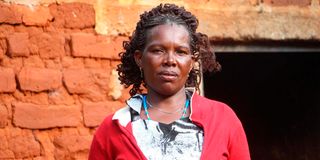My 'husband' wants me out: The traditional same-sex union that ended in shocking property dispute

Josephine Ndulu, who is married to Angela Nyamai in line with Kamba customs, during an interview with nation.africa at Kasolongo Village in Machakos County on July 7, 2024.
What you need to know:
- A court case involving a woman-to-woman marriage in Machakos County has exposed the vulnerabilities faced by women in traditional 'iweto' unions.
- Josephine Ndulu, who believed she was securely married to Angela Nyamai under Kamba customary law, now faces eviction from her home after a court ruled she had no rights to the property she shared with her 'wife'.
In the heart of Machakos County, a tale of love, tradition, and betrayal unfolds, challenging the very foundations of a unique marital custom.
Josephine Ndulu's world has been turned upside down, her dreams of a secure future shattered by a court ruling that has left her distraught and facing ridicule in her community.
"They're mocking me," Josephine tells nation.africa, her voice trembling with emotion.
"They say they're hatching a plan to kick me out of this homestead using a court order."
Her pain is palpable, a stark contrast to the relief felt by Angela Nyamai and her daughter Nthikwa Murimi, who sighed with relief as the five-year legal battle came to a close.
At the heart of this complex drama lies the practice of iweto marriage, a woman-to-woman union sanctioned by Kamba customary law. It's a tradition that has long provided a solution for widows, barren women, or those without sons, allowing them to secure their family lineage and social standing.
For years, Josephine believed she had found security in her marriage to Angela. As a peasant farmer, she had devoted herself to their shared life, tending to leased parcels of land in the neighbourhood. The union seemed to offer the prestige of marriage and the promise of a stable future.
But the idyllic facade crumbled in 2015 when Josephine discovered that Angela had been secretly selling parcels of their family land in Kasolongo Village. Feeling betrayed and fearing for her future, Josephine sought answers, only to find herself facing a plan to evict her from the very home she thought was hers.
Angela, operating from a different parcel of land in Machakos, justified the land sales as necessary to cover hospital bills. She claimed the land was gifted to her by her late husband, Joseph Munyao Kilonzo, before his death in 2005, asserting her right to dispose of it as she pleased.
The legal battle that ensued has shed light on the complexities of iweto marriages.

Josephine at her home in Kasolongo Village in Machakos County on July 7, 2024. She has suffered a blow in the case against her estranged ‘husband.’
While Angela attempted to divorce Josephine in 2016, the court directed her to follow Kamba customary law, highlighting the legal ambiguities surrounding such unions.
Josephine's quest for justice led her to file a case against Angela in 2019, seeking to nullify the land sales and secure her share of what she believed to be their joint property.
However, Machakos Principal Magistrate Hellen Mbati's ruling dealt a crushing blow to Josephine's hopes.
"The plaintiff only proved that she is an iweto," Magistrate Mbati stated in her ruling. "She neither contributed to the suit property nor provided any evidence of making improvements thereon."
The court's decision underscores the precarious position of women in iweto marriages, caught between tradition and modern legal frameworks.
Geoffrey Mutua, a Kamba clan elder who testified in the case, explained the intricacies of such marriages: "To prevent a woman from being ostracised for being childless, Kamba custom allows her to woo a young woman. If the young woman accepts the marriage proposal, the old woman observes all the ceremonies which apply in a conventional marriage, such as paying bride price."
The practice mirrors similar customs in other African communities, including the Igbo in Nigeria, the Nuer and Dinka in South Sudan, and even among the Nandi and Kikuyu in Kenya.
While it serves a social purpose, it also raises questions about the rights and status of the women involved.
Serah Ngila, a teacher who has extensively studied iweto marriages around Kangundo in Machakos County, notes that some women enter these unions motivated by the husband's wealth.
"Iweto marriage is one of the preferred options available for women without sons, though it contravenes Christian teaching," she explains in a paper dubbed ‘The persistence of Iweto Marriage among the Akamba Christians of Kangundo District Machakos County, Kenya’.
Read also:The ghost wives of Ukambani
"The society has not come to terms with other solutions such as adoption of children."
African literary icon David Maillu offers a different perspective, arguing that iweto is essentially an adoption to cure childlessness.
"The iweto marriage institution is as divine as the conventional marriage," he asserts. "It is meant for serving a particular purpose; siring children to keep the family name alive. An iweto is entitled to the property of her husband just the way an adopted child enjoys full rights like any other child."
Yet, as Josephine's case demonstrates, the reality can be far more complex and fraught with challenges. The court's ruling has exposed the vulnerabilities faced by women in such unions, particularly when it comes to property rights and inheritance.
Angela maintains that she is not married to Josephine, claiming that Josephine is merely a relative who came to stay with them and remained. She denies taking bride price to Josephine's parents, and refuses to discuss her 2016 attempt to divorce Josephine in a Machakos court.
This denial adds another layer of complexity to the case, highlighting the difficulties in legally recognising and protecting the rights of women in customary marriages that fall outside the scope of conventional marital laws.
The case has sparked debate about the place of such customary practices in contemporary society. As Kenya grapples with modernisation and changing social norms, traditions like iweto marriages find themselves under scrutiny, challenging both legal and social systems to adapt and provide equitable solutions.

Josephine at her homestead in Kisaki Village, Machakos County, which her estranged 'husband' sold in this March 26, 2019 photo.
For Josephine, the future remains uncertain. Forced to lease out parcels of land in the neighbourhood for farming, she faces the prospect of losing her home and the life she has built. Her story serves as a poignant reminder of the challenges faced by women navigating the intersection of tradition, law, and personal relationships.
As the community watches and whispers, Josephine and Angela stand on opposite sides of a divide that goes beyond personal conflict, touching on deeper issues of cultural practice, legal recognition, and the evolving nature of family in modern Kenya.
For now, Josephine's story remains unfinished, a testament to the complex interplay of love, tradition, and law in a rapidly changing society.





